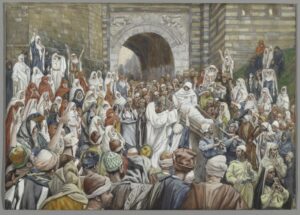Ephesians 3:3: “…by revelation, there was made known to me the mystery…”
What religion doesn’t include a good mystery?
In ancient Greece and Rome, mystery religions were prominent. These secretive cults, such as the Eleusinian Mysteries, promised initiation into secret knowledge, rituals, and experiences that were believed to bring spiritual enlightenment and a deeper connection with divine forces. Within Buddhism, the concept of mystery is present in the teachings related to enlightenment and nirvana. These states are often described as ineffable and beyond ordinary understanding, emphasizing the need for direct insight and personal experience. Theosophy, an esoteric philosophy that emerged in the late 19th century, emphasizes the study of mysteries and the hidden aspects of reality. Theosophists believe that underlying spiritual truths can be uncovered through study, meditation, and personal exploration.
In Ephesians 3:3-6, Paul announces, “…by revelation there was made known to me the mystery…which in other generations was not made known to the sons of men [humanity], as it was now revealed to His holy apostles and prophets…” But as opposed to the veiled revelations of other religions, which required initiation and enlightenment, these mysteries are clearly defined in Ephesians 3:6, “that the Gentiles [all non-Jews] are fellow heirs and fellow members of the body and fellow partakers of the promise in Christ Jesus through the gospel.”
Clearly, God had intended that the Jews, His chosen people, would be a vehicle for redemption to non-Jews, as expressed in Isaiah 42:6, “I will make you as a light for the nations, that my salvation may reach to the end of the earth.” Unfortunately, the Jews, desiring exclusivity, did a poor job as evangelists, even to the point of crucifying their Redeemer, Christ Jesus. But here, Christ announces a more direct approach to salvation as explained in Ephesians 3:10, where He states, “so that the manifold wisdom of God might now be made known through the church…” It is important to note that this wasn’t an afterthought because of failure on the part of the Jews. In fact, in Ephesians 3:11, Paul continues, “This was in accordance with the eternal purpose which He carried out in Christ Jesus our Lord.”
And what religion doesn’t like a good miracle?
In Roman Catholicism, miracles are a requirement of the sainthood candidacy process. In my post, “Who are the Saints?” I noted:
“Sainthood in the Catholic church has sometimes had an inglorious history. Reportedly, a local church in Sweden once canonized an alcoholic monk who was killed in a bar fight – hardly grounds for martyrdom…Because of past indiscretions, church leadership has formalized a process to approve someone as a saint. This procedure includes Candidacy, whereby panels of Theologians, Cardinals, Bishops, and even the Pope review a prospect’s life and death. The next stage is Beatification, where a verifiable miracle is required for any non-martyred candidate. At this point, they are declared Blessed. In the final stage, another miracle is needed for both Blessed martyrs and non-martyrs. Once this miracle is confirmed, they are Canonized. This authorizes public veneration by all Church members and the conferring of the title – Saint.”
In the Islamic faith, miracles are attributed to prophets and messengers, particularly Muhammad. These miracles include splitting the moon and water gushing from Muhammad’s hand. New Age belief systems encompass a wide range of practices and manifestations. Many emphasize the potential for miraculous experiences, personal transformation, healing, and supernatural abilities through tapping into higher consciousness or energy. Even within Christianity, the Charismatic movement is characterized by a belief in the ongoing expression of enchanted gifts, including the ability to perform miracles. Charismatics believe that the spiritual gifts listed in the New Testament, such as healing, prophecy, and speaking in tongues, are available to believers today.
The Bible indicates that Jesus Christ performed many signs and wonders, such as turning water into wine, calming the sea, healing the sick, and raising the dead. John 20:30-31 explains why, “Now Jesus did many other signs…so that you may believe that Jesus is the Christ, the Son of God and that by believing you may have life in His name.” Acts 2:22 provides further insight, “Men of Israel, hear these words: Jesus of Nazareth, a man attested to you by God with mighty works and wonders and signs that God did through Him in your midst…”
Similarly, Mark 16:17 explains the Apostles’ use of signs and wonders, “And these signs will accompany those who believe…” Acts 5:12 confirms, “The apostles performed many signs and wonders among the people.”
Yet Hebrews 2:4 makes a distinction between the verification of Christ by signs and wonders and that of miracles when it states, “…God also bore witness by signs and wonders and various miracles and by gifts of the Holy Spirit distributed according to his will.” Galatians 3:5 depicts a salvific aspect and declares, “…does He [Christ] who provides you with the Spirit and works miracles among you, do it by the works of the Law, or by hearing with faith?”
The Miracle
What, then, is this miracle? It is a miracle to which you still have access.
You may not be able to be raised from the dead or relieved of your infirmaries, but you have access to the miracle in Ephesians 3.
It’s in Ephesians 3:6, “…through the gospel [good news]” and Ephesians 3:8, “…proclaim to the Gentiles the good news…”
The miracle is “deliverance.” Christ acknowledges the magnificence of this miracle when He discusses salvation in Matthew 19:26 – “…Jesus looked at them and said, ‘With man this is impossible, but with God all things are possible.’”
The greatest miracle of all time is still available to you; it’s even offered as a free gift – salvation.








